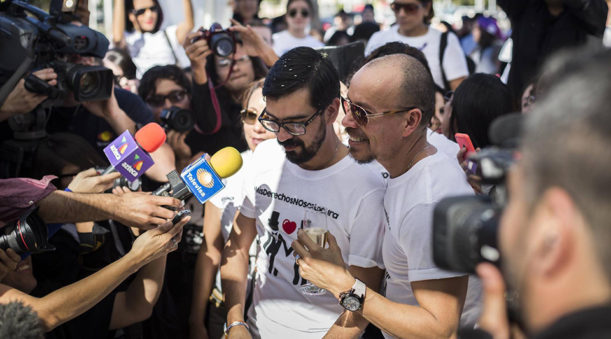Gael Garcia Bernal is a diamond in the desert…
The 38-year-old Mexican actor picked up the FIPRESCI Prize for best actor at the 27th annual Palm Springs International Film Festival for his performance in Pablo Larrain’s Neruda.

Garcia Bernal portrays Oscar Peluchonneau, the fascist Chief of the Policía de Investigaciones, in the film about poet and Communist Senator Pablo Neruda.
Neruda, which was selected as the Chilean entry for the Best Foreign Language Film at the 89th Academy Awards, also picked up the fest’s Cine Latino Award.
The John Schlesinger Award, presented to a director of a first or second feature documentary, was awarded to Cristina Herrera Borquez for No Dress Code Required, which looks at a same-sex couple as they fight for the right to marry in their hometown of Mexicali, Baja California.
The fest, which ran through January 16, announced its juried award winners at a luncheon Saturday at the Hilton Palm Springs.
Here’s the complete list of winners:
FIPRESCI Prize for Best Foreign Language Film of the Year
Toni Erdmann (Germany), directed by Maren Ade
FIPRESCI Prize for the Best Actor in a Foreign Language Film
Gael García Bernal in Neruda (Chile)
FIPRESCI Prize for Best Actress in a Foreign Language Film
Isabelle Huppert in Elle(France)
New Voices/New Visions Award
Winner: White Sun (Nepal/U.S./Qatar/Netherlands), directed by Deepak Runiyar
Special Mentions: Kati Kati (Kenya/Germany), directed by Mbithi Masya and Mellow Mud (Latvia), directed by Renārs Vimba
The John Schlesinger Award
Winner: No Dress Code Required (Mexico), directed by Cristina Herrera Bórquez
Special Mention: Beauties of the Night (Mexico), directed by Maria José Cuevas
Cine Latino Award
Winner: Neruda (Chile), directed by Pablo Larraín
Special Mention: Everything Else (Mexico), directed by Natalia Alamda
HP Bridging the Borders Award
Winner: Mercenary (France), directed by Sacha Wolff

